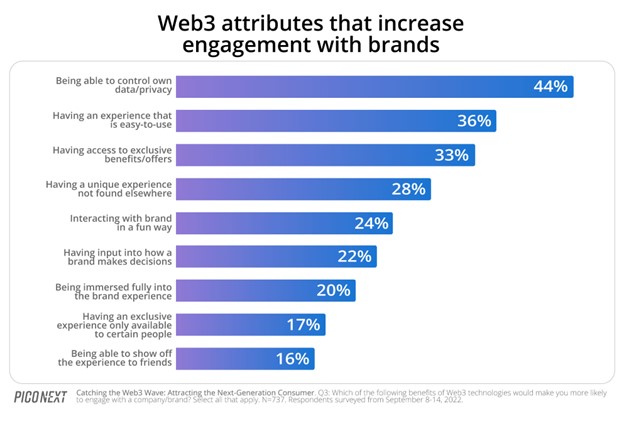Web3 has been heralded as a way to revolutionize how brands engage with their customers.
The decentralized technologies that comprise Web3—digital tokens, blockchains, distributed autonomous organizations, and others—promise to give customers more control over how they interact with companies and, in return, provide enterprise marketers a way to drive direct engagement.
From increasing customer autonomy over data ownership to driving more transparency with companies, the promise of Web3 is that customers will have the ability to engage with brands how and where they want.
Because the technologies around Web3 are still developing, brands are experimenting with it to make sure they're ready when adoption accelerates—and to future-proof their strategies so they can meet customers where they are. Although it will take time to realize the full vision of Web3, enterprises can take advantage of Web3 use cases today to engage their audiences.
Many of the current use cases for Web3 focus on consumer marketing use cases such as branded collectibles, loyalty programs, and gamified brand activations. However, opportunities also exist for B2B enterprise companies to use Web3 technologies to engage with customers.
Consider the following six areas where you can use Web3 to accelerate customer acquisition, shorten sales cycles, and reduce churn.
1. Privacy-Based Experiences
In our recent survey of US consumers about Web3, respondents say privacy is the most important factor driving brand engagement in relation to Web3 technologies.
At a minimum, users can provide a digital wallet address to receive a Web3 token, and they can choose to provide other data (such as an email address) to receive other benefits or receive additional offers. Those Web3 tokens can be used to access brand content, demos, virtual-reality experiences, and other opportunities.
As third-party cookies are phased out, Web3 tokens can be an effective way for brands to drive direct engagement with customers, allowing them to interact with them in a privacy-conscious way.

2. New Product Offerings
Web3 tokens can help you deliver new products and services to your B2B users. For example, customers might purchase real-world support packages and receive a Web3 token that allows them to access differentiated real-world benefits in return. Or the Web3 token could unlock completely new digital offerings, such as access to product trials, training simulators, or virtual reality assets.
Because Web3 experience tokens can help provide a unique experience or status to a membership tier or customer group, brands can deliver additional offerings to those groups to encourage repeat engagement.
3. Event Marketing
Enterprise B2B marketers use events to help generate demand and move prospects through the funnel. Whether through user conferences or regional seminar events, Web3 tokens can serve as credentials to access the event, facilitate privacy-conscious data exchange when connecting with vendors and other participants, and unlock additional perks and rewards within the event itself.
4. Customer Communities
B2B sales cycles often require multiple weeks or months to complete, involving many customer touchpoints along the way. Web3 can help connect those dots with customer communities that provide access to exclusive, relevant content for targeted groups.
When customers or prospects authenticate with a digital token, they can continue the brand conversation online in a community that may include access to exclusive tips, how-to content, case studies, and support information, as well as special promotions and discounts. You can also segment active community enthusiasts for additional offers from your brand, helping loyalists spread your message.
4. Product Sourcing
For some enterprise products, the provenance of parts and materials is core to its value proposition. When product components are sourced from various parts of a complex supply chain, vendors and other organizations (such as auditors) can attest to their veracity using blockchain-based events, which are immutably recorded in a distributed ledger and can be traced. Customers and others can then track those events across time using a blockchain-based viewer, and so they'd have greater confidence in the marketing claims of your brand's products.
5. Social Impact and Cause Marketing
For brands selling to enterprises, corporate social responsibility messaging is often an important part of the equation, helping to differentiate one brand's products from another's in a competitive marketplace.
Using Web3 technologies, companies can align their brand messaging with the values of their customers through cause marketing initiatives.
For example, for each Web3 experience token that a brand issues to a customer, the token's smart contract can contribute a programmatic monetary donation to a social impact group aligned with the brand, helping to create change in the communities it serves.
6. Climate Sustainability
Many enterprise companies are concerned with the environmental impact of their operations—whether as a result of direct emissions from manufacturing operations, or resource consumption by large-scale data centers, or other processes.
One way that Web3 tokens can be used to support social impact is by providing transparency into carbon removal programs. Companies can coordinate climate efforts by issuing Web3 tokens, associating carbon removal events with the token as part of the public blockchain record, and ensuring that the carbon removal is traceable and trackable. Stakeholders can then track those carbon removal events to monitor progress.
* * *
Using Web3 for enterprise B2B marketing can be a powerful tool for brands to attract, engage, and retain customers. By taking advantage of the benefits of Web3 technology, companies can drive increased customer engagement and unlock new value from their products and services.
Whether through exclusive content in customer communities, increased transparency into product sourcing, or event and cause marketing initiatives, Web3 technologies provide a new way for brands to differentiate themselves in a competitive market.
More Resources on Web3 for Marketers
Web 3.0, Blockchain, and the Metaverse: Opportunities for B2B Marketing




